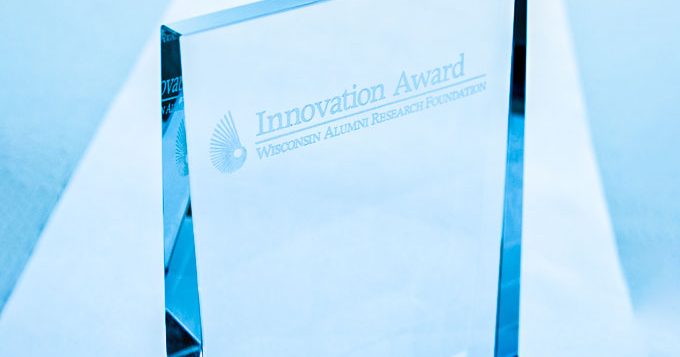Two UW-Madison teams selected from 350+ innovation disclosures
CONTACT:
Jeanan Yasiri Moe
Director of Strategic Communications and Public Affairs
[email protected] | (608) 960-9892
MADISON, Wis. – A simplified cancer screening process and a new way to break down ‘forever chemicals’ have taken top honors from WARF.
The first 2024 WARF Innovation Award has been given to the University of Wisconsin-Madison’s Muhammed Murtaza, associate professor of surgery, and surgery researcher Michelle Stephens for their work, Simplifying the Process for Early Detection, Screening of Cancer.
Many of today’s most effective cancer detection and screening methods are costly and require that patients travel to a clinic for a blood draw, limiting factors for individuals in low-resourced and rural settings. The team developed a diagnostic that allows for at-home collection of blood samples, making the early screening and detection of cancer easier and more cost effective and improving health equity for millions of individuals.
The other winning team includes Song Jin, professor of chemistry, and graduate student Katelyn Michael for their work, Inventive Electrochemical Process Breaks Down ‘Forever Chemicals.’
The electrochemical process developed by the team delivers a one-two punch to PFAS (per- and polyfluoroalkyl substances). These molecules, found in everyday products like packaging and nonstick cookware, were once thought impossible to destroy and pose serious environmental and public health challenges. The technology uses an inventive design to allow two typically incompatible processes for the destruction of PFAS to occur in a single cell, opening the door for electrochemical degradation of PFAS at scale.
An independent panel of judges selected the winners from a field of six finalists drawn from hundreds of invention disclosures submitted to WARF over the prior 12 months. The winning teams each receive an award of $10,000, with the funds going to the named UW-Madison inventors.
“Each year, our Innovation Awards shine a spotlight on the most exciting early-stage discoveries on campus,” says Erik Iverson, CEO of WARF. “We’re pleased to celebrate the nominees and all UW-Madison innovators working to discover and translate research with the power to impact lives.”
The other 2024 WARF Innovation Award finalists are:
Innovative Screening Tool Better Detects Likelihood of Age-Related Diseases
- Perry Pickhardt (Radiology)
- John Garrett (Radiology)
- Michael Kattan (Cleveland Clinic Foundation)
New Membrane Material Improves Long-Term Battery Performance for Energy Storage
- Xudong Wang (Materials Science and Engineering)
- Yutao Dong (Materials Science and Engineering)
New Way to Measure Arterial Stiffness Leads to Better Blood Pressure Treatment Plans
- Adam Gepner (Medicine)
- Ryan Pewowaruk (Medicine)
Converter Improves Efficiency, Stability of Power Transmission in Renewables
- Venkata Giri Venkataramanan (Electrical and Computer Engineering)
- Jinia Roy (Electrical and Computer Engineering)
- Dominic Gross (Electrical and Computer Engineering)
- Mahima Gupta (Electrical and Computer Engineering)
About WARF
Incorporated as a nonprofit foundation in 1925, WARF has a founding purpose “to promote, encourage, and aid scientific investigation and research at and within the University of Wisconsin-Madison.” Over 99 years the foundation has funded more than $4.5 billion in cumulative research grants to UW-Madison and the Morgridge Institute for Research (adjusted for inflation), has been issued more than 4,200 patents (with 2,200 active patents), generates an additional 375 invention disclosures and 55 revenue-generating licenses each year, and has helped create 190 startup companies based on UW-Madison technologies. For more information, visit warf.org and watch a video about how WARF stewards the Cycle of Innovation.
###
